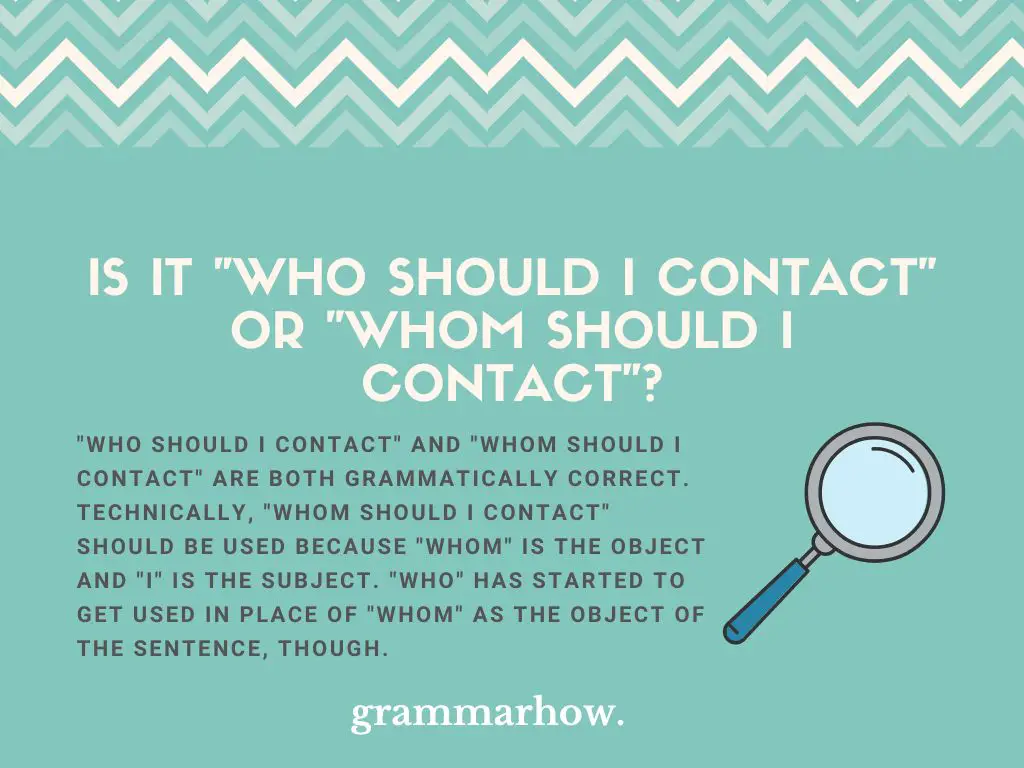“Whom” and “who” have overlapping meanings in English. “Whom” used to be much more popular than it is today, and it would help to learn why that might have happened. This article will explain how to use “who” or “whom should I contact.”
Is It “Who Should I Contact” or “Whom Should I Contact”?
“Who should I contact” and “whom should I contact” are both grammatically correct. Technically, “whom should I contact” should be used because “whom” is the object and “I” is the subject. “Who” has started to get used in place of “whom” as the object of the sentence, though.

Many people believe that “whom” is old-fashioned and outdated. They do not like the formal tone that tends to come with it, and native speakers have managed to phase the word out over time. If used today, most native speakers will think it sounds quite jarring.
“Whom” was the original object pronoun for “who.” It works well when using subject pronouns like “I” and has been the more important choice historically.
Over the last few decades, “who” has taken on the same meaning. It is now used as the object of the sentence in the same way as “whom,” but many native speakers think it sounds more natural in this manner.
With all that said, you can use the two phrases interchangeably. It really depends on whether you’re writing formally (using “whom”) or informally (using “who”).
According to Google Ngram Viewer, “who should I contact” is the more popular choice of the two. You can also go back a few decades to see that the two phrases were switching in popularity until “who” finally became the most popular choice without question.

Who Should I Contact
“Who should I contact” is the more common way of writing the sentence today. “Who” has started to become the object of the sentence, just like “whom” was before it. Therefore, we can use it alongside the subject “I” with no problems.
Originally, “who” was treated as the subject of the sentence. That would mean that “who” and “I” couldn’t be used in the same phrase. This meaning has since changed as the language evolved to make it simpler for users.
- I would like to know, who should I contact about this? I think it would help me to get their info.
- Who should I contact? I want to make sure I get the most helpful person.
- Who should I contact, then? I’m not entirely sure I’ve got the right information here.
- And who should I contact? You’ve yet to give me a name, even though I’ve been asking you for it.
Whom Should I Contact
“Whom should I contact” is the more traditional way of writing this sentence. We use “whom” because it’s the object of the sentence. “I” is already used as the subject in this question, so it makes sense that the two should be written together.
Of course, plenty of native speakers use “whom” and “who” incorrectly all the time. You shouldn’t feel too disheartened if you find yourself getting it wrong. It takes practice, after all.
- Wait, whom should I contact? I didn’t hear you when you gave me the name. Could you speak up?
- And whom should I contact to get this issue resolved? I’d like to know the name.
- I think you should tell me, whom should I contact? It’s about time we get some more structure in this place.
- Whom should I contact, then? I want to find out the best methods for dealing with these problems.
Which Should I Contact
“Which should I contact” is not a particularly common phrase. Nevertheless, you can use it when you want to talk about objects and things rather than people. “Whom” and “who” are limited only to people, but “which” can branch out to other ideas.
- Which should I contact from this list? I want to make sure I know what I’m getting myself into.
- Which of these numbers should I contact? I’m afraid I’ve got a list of numbers I don’t even recognize.
- Which of these should I contact? Do you have any inside information that might help me get my point across?
- Which of those should I contact? You haven’t given me an honest answer about it yet.
Final Thoughts
“Who should I contact” and “whom should I contact” are both correct. Usually, “whom” is best when writing formally as it sticks to the original, formal rules associated with the object pronoun. “Who” is better informally, and it’s becoming more popular as time goes on.
You may also like:
“Who to Contact” or “Whom to Contact”? (Correct Version)
Is It “Who Am I Speaking To” or “Whom Am I Speaking To”?
“Who Are You Waiting For” or “Whom Are You Waiting For”?

Martin holds a Master’s degree in Finance and International Business. He has six years of experience in professional communication with clients, executives, and colleagues. Furthermore, he has teaching experience from Aarhus University. Martin has been featured as an expert in communication and teaching on Forbes and Shopify. Read more about Martin here.
